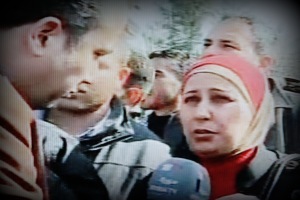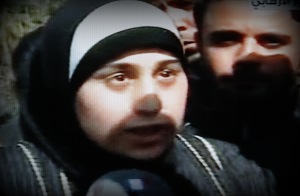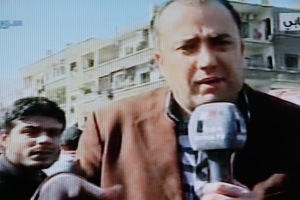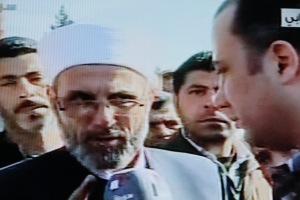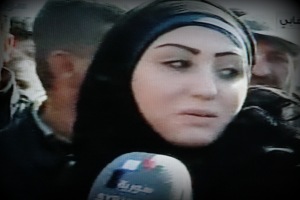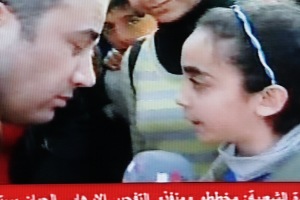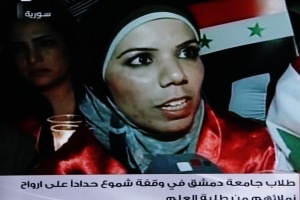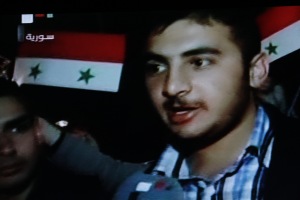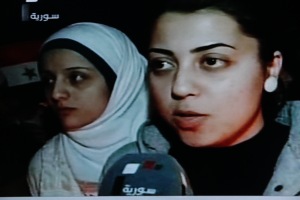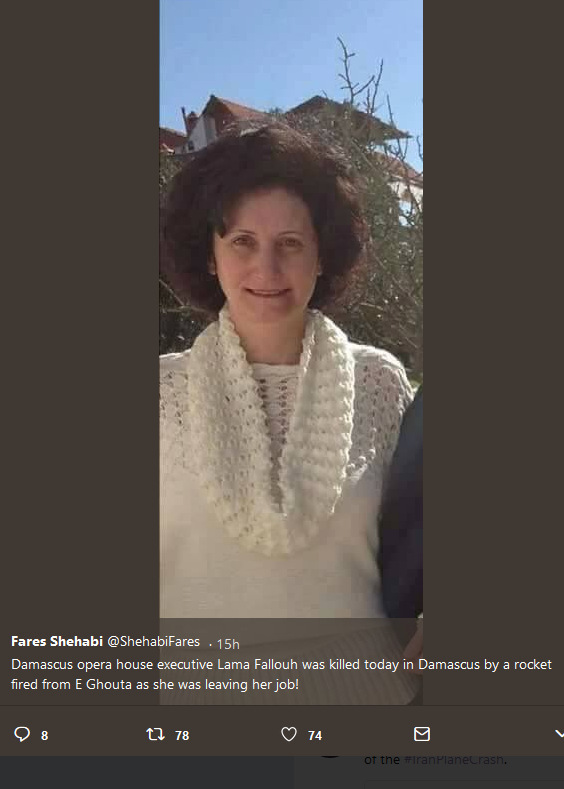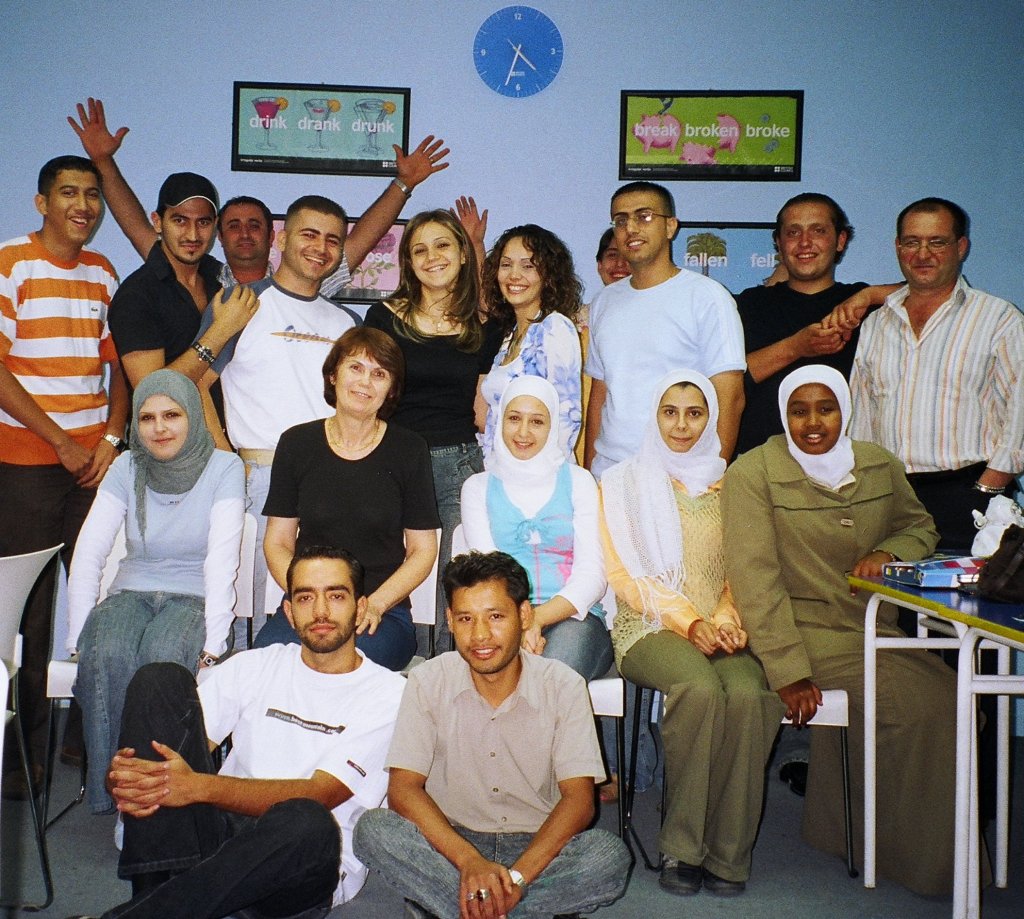Updated with edits on Monday 4 - 14 May 2020
CONTENTS
Page 1: Complaint letter to ABC Audience and Consumer Affairs, 19 March 2020
Page 2: Response from ABC Audience and Consumer Affairs, dated 4 May 2020
Page 3: ABC’s Ms Sophie McNeill Spruiks a Nebulous ‘Revolution’ in Syria
Page 4: Reference List with Alternative Analysis
Page 5: Gallery – The Syria That Was And That Could Be
Bottom images, Syrian TV: March 2013, students at a vigil following a mortar attack on Damascus University that killed students sitting in a uni cafeteria, (See Reuters report.)
____________________________________________
The 1,500 word complaint letter below was submitted online to ABC Audience and Consumer Affairs following Phillip Adams’ interview with Sophie McNeill broadcast on Radio National’s Late Night Live on Monday 9 March 2020. (Note: hyperlinks could not be included in the ABC’s online complaint form.)
________________________________________
Complaint Letter
Location: VIC
Response Required: Yes
Program: Late Night Live
Program Date: 2020-03-09
ABC Service\Network: Radio National
ABC Recipient: Audience & Consumer Affairs
Subject: Phillip Adams and Sophie McNeill breach the ABC Code of Practice in their discussion about Syria
INTRODUCTION
The war in Syria seems exceedingly complex because of the number of players involved and because of its many shifting and competing narratives.
The few Australian journalists who have reported from Syria to give ‘ordinary’ Syrians a voice include former SBS reporters Mark Davis and Luke Waters and more recently freelance reporter Chris Ray. In one of his articles, Ray presented the stories of Syrians severely impacted by the harsh US-led sanctions that are still being imposed on Syria.
American journalist James Foley, who was executed by a British jihadist, proved how risky it could be to report from Syria. While embedded with Free Syrian Army rebels in Aleppo, he also presented the perspectives of Syrians he met who opposed them.
Alex Thomson, who reported from both Damascus and rebel-held areas for UK’s Channel Four, wrote about his experience of being nearly killed after being set up by rebels who must have calculated that his death would serve their cause.
Unlike the above journalists, ABC’s Sophie McNeill gleans her understanding of the war in Syria from outside Syria and, it seems, almost wholly from supporters of what she describes as the ‘revolution’.
As a consequence, McNeill presents ABC audiences with an extremely crude and biased understanding of the war in Syria, giving us a lazy, glib picture of Syria, an historically and culturally rich and sophisticated country: Assad is a brutal dictator who kills his own people. The rebels can be trusted. (It is not so different from the certainties held by ‘white’ Australia about the invasion and occupation of the First Nations’ land.)
On 9 March 2020, when ABC’s Late Night Live’s Phillip Adams interviewed McNeill about her recently published book, ‘We Can’t Say We Didn’t Know’ (ABC Books), Adams echoed McNeill’s support for the ‘revolution’ and even amplified her hero-worship of a rebel she had befriended, saying Khalid Naanaa, now an Australian citizen, should be made Australian of the Year.
In breaching the following core principles of journalism, the LNL interview with McNeill no doubt also breached the ABC Code of Practice.
1. Truth and Accuracy
To seek the truth of events in Syria requires vigorous research. However, neither McNeill nor Adams doubt the ‘evidence’ given McNeill by supporters of the ‘revolution’. Its ‘evidence’ that tells us nothing about the crimes of ‘rebels’; it simply damns Syrian government forces.
Syrian nurse Khalid Naanaa is key to McNeill’s story of Syria and her support for the ‘revolution’. He had gone to the town of Madaya to support the ‘revolution’. After the town came under siege by Syrian government and Hezbollah forces, he sent McNeill images and videos on WhatsApp showing starving people.
McNeill tells Adams that Médecins Sans Frontières corroborated the ‘evidence’. But neither she nor Adams considered that the people in the videos and images sent her may have in fact been deprived of food by the powerful rebel groups who controlled the town and food distribution. Also, they assumed that the MSF corroboration was impartial and reliable.
However, in dangerous rebel-controlled areas of Syria, MSF would have had representatives on the ground who were vetted by the rebels. It would have been too dangerous to send any impartial Australian doctors purely interested in doing humanitarian work.
It is not only NGOs like MSF that cannot be relied on to present an impartial and full picture of events in Syria. UN reports on the war in Syria are skewed to favour testimonies that support the ‘rebel’ cause.
Bias in UN reporting on Syria is inevitable because, since the start of the ‘Arab Sping’, the three UN Under-Secretary Generals for Humanitarian Affairs have represented the British ‘establishment’: one baroness and two knights. The baroness and one of the knights were politicians who voted for Britain’s involvement in the war in Iraq.
McNeill looks to a former American Ambassador to the UN, Samantha Power, for support, seemingly forgetting the role the US administration played in the catastrophic war in Iraq and the official and criminal disinformation which enabled that war.
For McNeill and Adams to imagine that ‘rebels’ in Syria, who would be cognisant of the West’s criminal acts in the Middle East, are genuine allies of the West is the height of foolishness.
LNL listeners are not provided with facts about the ‘revolution’ which would enable them to make up their own minds about the reliability of McNeill’s fixers and ‘rebel’ friends.
For the sake of truth and accuracy, they should be looking for answers to the following questions about the ‘revolution’:
a. Besides ISIS, what are the dominant ‘rebel’ groups in Syria and what are their ideologies and strategies?
b. Is the ‘revolution’ intent on imposing a caliphate in Syria and the region?
c. If so, do ‘rebels’ target civilians who support the secular state?
d. Who are prominent clerics that are active supporters of the ‘revolution’?
e. What sort of support do Australia’s traditional allies give rebels?
f. Does such foreign support to insurgents break international rules?
g. What Australians have joined the rebels?
h, What rights and freedoms might Syrian women have to forego if the ‘revolution’ is victorious?
i. Do Syrian women tend to support the ‘revolution’ or the secular state?
Adams is well-known for his support for Julian Assange and yet, in echoing McNeill’s crude take on the war in Syria, he ignores Wikileaks revelations about the US role in the war in Syria and the more recent explosive revelations about a redacted OPCW report into an alleged chemical weapons attack in Syria in April 2018.
Adams’ support for McNeill’s unsophisticated, poorly researched and biased views on Syria curiously contrast with his public support for Assange, whose understanding of the world is extremely sophisticated, drawing as it does on a wealth of material and a commitment to fearlessly exposing the crimes of the most powerful.
2. Independence
McNeill does not hide her support for the ‘revolution’ and her admiration for people who fight and/or advocate for it. Adams simply echoes her bias, even amplifies it at times.
3. Fairness and Impartiality
McNeill and Adams might argue that in regard to the war in Syria objectivity is not possible or desirable in response to the ‘brutality and inhumanity’ of the ‘Assad regime’ which, they might claim, far outweighs the brutality of ‘rebels’.
However, such a simplistic, biased response to the Syrian war cannot be justified unless it is based on an impartial in-depth search for the truth giving respectful attention to all sides affected by the war, particularly ‘ordinary’ Syrians.
To be fair and impartial, they should be especially sceptical of claims of people and NGOs that are partisan players; but neither McNeill or Adams is.
There is no evidence that McNeill has done any rigorous impartial research or that Adams is at all interested in such research. The firm stand McNeill and Adams take against the Syrian government and for the ‘revolution’ eschews the rigorous and impartial research of award-wining US journalists, such as Seymour Hersh and the late Robert Parry. Furthermore, there is much to learn about Syria from journalists not generally published in the mainstream media, such as Max Blumenthal, Rick Sterling, John Pilger, and Sharmine Narwani.
McNeill and Adams deny the concerns and perspectives of millions of Syrians who continue to support secular state institutions in Syria.
4. Humanity
A core principle of journalism is to do no harm. By extolling a violent ‘revolution’ in Syria and championing its advocates, McNeill and Adams can contribute to continuing harm being done not only to the people of Syria but also to Australians.
As mentioned above, Naanaa, whom they hail as a hero, joined the ‘revolution’ in the town of Madaya, close to the Lebanese border. The dominant insurgent group in control of Madaya, was Ahrar al-Sham al-Islamiyya, a group that fights for ‘a pan-Islamist Sunni jihad’. (Ref: Meet the Syrian Rebel Commander in the Besieged City of Madaya, by Avi Asher-Schapiro, Vice News, 31 Jan 2016; ’Ahrar al-Sham’s apocalyptic vision for Syria and beyond’, by Nafeez Ahmed, Middle East Eye, 16 Oct 2015)
McNeill’s and Adam’s inferred support for groups such as Ahrar al-Sham gives credence to a ‘jihad’ that has attracted some Sunni Australians to an extreme form of Islam. Such an unequivocal advocacy for the so-called revolution on ABC’s LNL makes it exceedingly difficult for impartial and informed points of view to be expressed by other mainstream Australians journalists or politicians. It quashes serious discussion about Syria both within the ABC and on the ABC. It also helps maintain an Australian foreign policy that continues to follow the US lead and continues to inflict great harm on people in Syria through the imposition of sanctions.
Moreover, the unquestioning support for US foreign policy on Syria puts ADF personnel on the side of ‘rebels’ and their caliphate and against a secular state and Syrians that support freedoms and rights comparable to those women and religious groups enjoy in Australia. It undermines the moral and ethical stands Australians want to take in wars and more generally on the world stage
Ms Susan Dirgham
19 March 2020
PAGE 1 OF 5

